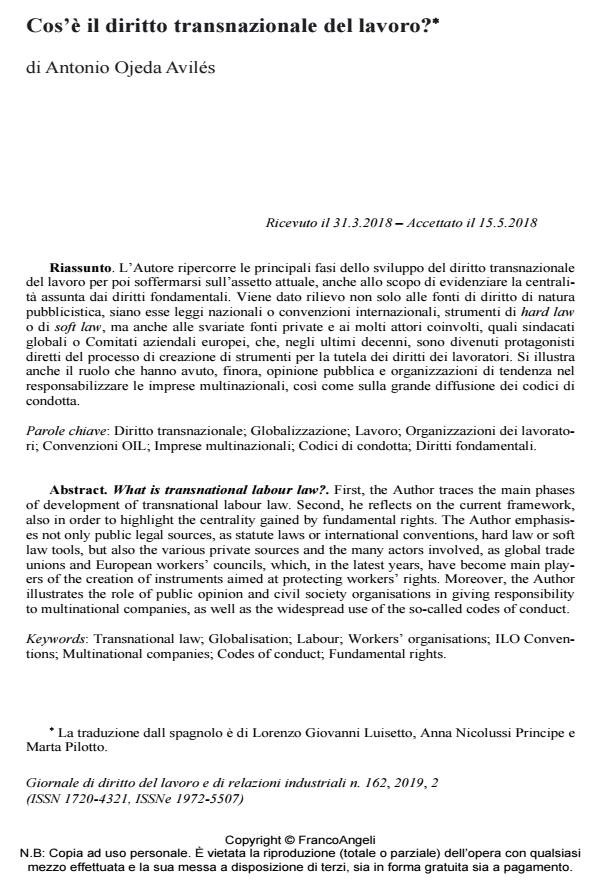Cos’è il diritto transnazionale del lavoro?
Titolo Rivista GIORNALE DI DIRITTO DEL LAVORO E DI RELAZIONI INDUSTRIALI
Autori/Curatori Antonio Ojeda Avilés
Anno di pubblicazione 2019 Fascicolo 2019/162
Lingua Italiano Numero pagine 27 P. 385-411 Dimensione file 306 KB
DOI 10.3280/GDL2019-162007
Il DOI è il codice a barre della proprietà intellettuale: per saperne di più
clicca qui
Qui sotto puoi vedere in anteprima la prima pagina di questo articolo.
Se questo articolo ti interessa, lo puoi acquistare (e scaricare in formato pdf) seguendo le facili indicazioni per acquistare il download credit. Acquista Download Credits per scaricare questo Articolo in formato PDF

FrancoAngeli è membro della Publishers International Linking Association, Inc (PILA), associazione indipendente e non profit per facilitare (attraverso i servizi tecnologici implementati da CrossRef.org) l’accesso degli studiosi ai contenuti digitali nelle pubblicazioni professionali e scientifiche.
L’Autore ripercorre le principali fasi dello sviluppo del diritto transnazionale del lavoro per poi soffermarsi sull’assetto attuale, anche allo scopo di evidenziare la centralità assunta dai diritti fondamentali. Viene dato rilievo non solo alle fonti di diritto di natura pubblicistica, siano esse leggi nazionali o convenzioni internazionali, strumenti di hard law o di soft law, ma anche alle svariate fonti private e ai molti attori coinvolti, quali sindacati globali o Comitati aziendali europei, che, negli ultimi decenni, sono divenuti protagonisti diretti del processo di creazione di strumenti per la tutela dei diritti dei lavoratori. Si illustra anche il ruolo che hanno avuto, finora, opinione pubblica e organizzazioni di tendenza nel responsabilizzare le imprese multinazionali, così come sulla grande diffusione dei codici di condotta.
Parole chiave:Diritto transnazionale; Globalizzazione; Lavoro; Organizzazioni dei lavoratori; Convenzioni OIL; Imprese multinazionali; Codici di condotta; Diritti fondamentali.
Antonio Ojeda Avilés, Cos’è il diritto transnazionale del lavoro? in "GIORNALE DI DIRITTO DEL LAVORO E DI RELAZIONI INDUSTRIALI " 162/2019, pp 385-411, DOI: 10.3280/GDL2019-162007